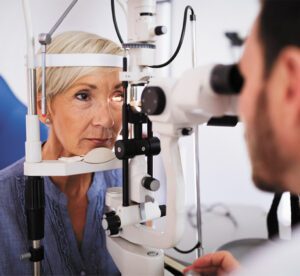By Thomas G. Ward, D.O.
 November marks American Diabetes Month, a time to raise awareness about diabetes and its impact on millions of lives. While many associate diabetes with blood sugar levels and insulin, its effects extend far beyond, particularly to eye health. This often-overlooked aspect of diabetes management deserves our attention, as diabetic eye diseases are leading causes of vision impairment and blindness among working-age adults.
November marks American Diabetes Month, a time to raise awareness about diabetes and its impact on millions of lives. While many associate diabetes with blood sugar levels and insulin, its effects extend far beyond, particularly to eye health. This often-overlooked aspect of diabetes management deserves our attention, as diabetic eye diseases are leading causes of vision impairment and blindness among working-age adults.
Diabetes can significantly affect eye health through various conditions collectively known as diabetic eye disease. The most common of these is diabetic retinopathy, which occurs when high blood sugar levels damage the blood vessels in the retina. This can lead to vision problems and, if left untreated, blindness. Other diabetes-related eye conditions include diabetic macular edema, cataracts, and glaucoma.
The risk of developing these eye problems increases the longer a person has diabetes. However, the good news is that with proper management and regular check-ups, many of these issues can be prevented or their progression slowed. This is why American Diabetes Month serves as a crucial reminder for those with diabetes to prioritize their eye health.
For individuals living with diabetes, maintaining good eye health starts with managing blood sugar levels. Keeping glucose levels within the target range can significantly reduce the risk of developing diabetic eye diseases or slow their progression. This involves following a balanced diet, regular exercise, and taking medications as prescribed by healthcare providers.
Regular comprehensive dilated eye exams are another critical component of preserving vision for people with diabetes. The American Diabetes Association recommends that adults with type 1 diabetes should have a comprehensive eye exam within five years of diagnosis. Those with type 2 diabetes should have an exam at the time of diagnosis. After that, everyone with diabetes should have annual eye exams, or more frequently if recommended by an eye care professional.
During these exams, an eye care specialist can detect early signs of diabetic eye disease before noticeable symptoms occur. Early detection is crucial because many treatments are most effective when started in the early stages of the disease. These treatments may include laser therapy, injections of anti-VEGF drugs, or in some cases, surgery.
It’s important to note that diabetic eye diseases often develop without early warning signs. When symptoms do appear, they may include blurry vision, dark or empty areas in your vision, difficulty perceiving colors, or vision loss. If you experience any of these symptoms, it’s crucial to seek immediate medical attention.
Beyond medical interventions, lifestyle choices play a significant role in maintaining eye health for people with diabetes. Quitting smoking, controlling blood pressure, and maintaining a healthy weight can all contribute to better eye health and overall diabetes management. Additionally, protecting your eyes from UV rays by wearing sunglasses and maintaining good overall hygiene can help prevent eye infections.
Nutrition also plays a vital role in eye health for people with diabetes. Foods rich in vitamins C and E, zinc, lutein, zeaxanthin, and omega-3 fatty acids can support eye health. These nutrients are found in green leafy vegetables, fish, nuts, and citrus fruits. Incorporating these foods into a diabetes-friendly diet can provide dual benefits for blood sugar control and eye health.
This American Diabetes Month, let’s shine a spotlight on the importance of eye health in diabetes care. By raising awareness about the link between diabetes and eye health, we can encourage more people to take proactive steps in preserving their vision. Whether you have diabetes or know someone who does, spread the word about the importance of regular eye exams and comprehensive diabetes management.
Remember, vision loss from diabetes is often preventable with early detection and proper care. By focusing on eye health this November, we can help ensure that those living with diabetes maintain clear vision for years to come. Empowering individuals with knowledge about the connection between diabetes and eye health is a crucial step towards reducing the incidence of diabetes-related vision problems and improving overall quality of life for those affected by this condition.
Retina Group of Florida
If you are experiencing any changes in your eye health, whether it is blurry vision, pain, impaired vision, or any other visual irregularities, you should see an ophthalmologist right away. The earlier a disease is detected, the better the outcome and treatment options are for you. You will find a friendly and warm environment at Retina Group of Florida.
Please call (352) 419-8928 today to schedule your eye exam. When necessary same day appointments can often be accommodated.
Thomas G. Ward, D.O.
212 South Apopka Avenue
Inverness, Florida 34452
352-419-8928
retinagroupflorida.com
 Central Florida Health and Wellness Magazine Health and Wellness Articles of the Villages
Central Florida Health and Wellness Magazine Health and Wellness Articles of the Villages



